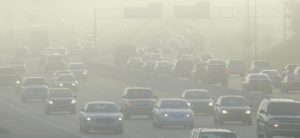 A new study has nicely illustrated how extreme air pollution gets quickly into a person and has negative health effects, but improvement occurs when the exposure to the air pollution ends.
A new study has nicely illustrated how extreme air pollution gets quickly into a person and has negative health effects, but improvement occurs when the exposure to the air pollution ends.
It has long been known that long-term exposure to air pollution is associated with increased heart disease and death from heart disease (cardiovascular morbidity and mortality). But now University of California researchers showed that even relatively short term exposure to high levels of air pollution has negative health effects, such as an increase in inflammation and systemic oxidation (which are linked to heart disease).
The researchers looked at 26 healthy young adults from Los Angeles who visited Beijing for a 10 week period during the summers of 2014 and 2015. They looked at both health effects (such as levels of inflammation) and also what pollutants are found in their bodies. And yes, they found both markers for inflammation and heart disease, as well as high levels of pollutants after being in Beijing for 10 weeks.
Beijing is much more polluted than Los Angeles. For example, levels of small particles in the air (PM2.5) was on average 371% higher in Beijing than Los Angeles, and concentrations of nitrogen dioxide, sulfur dioxide, carbon monoxide, polycyclic aromatic hydrocarbons (PAHs), and ozone were also at higher levels in Beijing than Los Angeles. [Note: PAHs are a group of combustion-originated air pollutants.]
Interestingly, Los Angeles air used to be much more polluted, but environmental policies and regulations resulted in the air becoming cleaner. In other words, steps can be taken to lower levels of air pollution, with would result in health benefits for everyone.
Excerpts from Medical Xpress: Study finds even a short-term visit to a severely polluted city is bad for your health
A new study by researchers at UCLA shows that even a short-term visit to a severely polluted city can be detrimental to one's health. The study involved 26 non-smoking, healthy adults (with a mean age of 23.8 years) who traveled from Los Angeles to Beijing during the summers of 2014 and 2015 over a 10-week period. The study participants were split into two groups and blood samples were taken in the first group at eight weeks and in the second group at six weeks after arrival in Beijing. The study was done in collaboration with Peking University in Beijing.
The study participants experienced significant health changes during their time in Beijing, including higher levels of oxidized fats, causing increased heart inflammation; and a change in enzyme function, which is associated with heart disease. The study also found that these individuals had up to an 800 percent greater concentration of air pollutants in their bodies than they did when in Los Angeles.
The good news is that when they returned to Los Angeles, most of the negative health effects largely reversed within four to seven weeks. The research is published in the journal Circulation from the American Heart Association.
"It's widely known that long-term exposure to air pollution is associated with increased cardiovascular disease. But it was unknown whether a short-term visit to a location with severe air pollution could have any significant impact," said the lead author of the study, Dr. Jesus Araujo, professor of medicine and director of environmental cardiology at the David Geffen School of Medicine at UCLA. He is also a professor of environmental health sciences at the UCLA Fielding School of Public Health.
Araujo's interest in this topic stemmed from previous research he conducted on air pollution exposure in animals. His research showed pronounced health effects in animals within just two weeks of exposure to pollution. His new study is the first to look specifically at the cardiovascular health effects of short-term air pollution exposure in humans, and notably, in healthy humans.
Neither Beijing nor Los Angeles is known for its clean air, but Beijing's air quality is significantly worse. The concentration of airborne particles in Beijing was on average 371 percent higher than in Los Angeles during the time of the study.
It's important to note that Beijing is only one of many highly polluted cities that draws millions of tourists and business travelers each year. Several other cities in China and India are among the most polluted in the world. Even London and Paris have pollution levels that exceed the legal limits set by the World Health Organization.
There are some ways to mitigate the risk of developing health issues when traveling to polluted cities. Araujo recommends avoiding intense physical activity, such as running outdoors or hiking. For individuals with preexisting cardiovascular health conditions, avoiding travel to these locations for extended periods of time is another consideration, especially around peak times of high air pollution levels. If one must travel for extended periods of time, the doctor recommends staying indoors as much as possible with air purifiers running.
